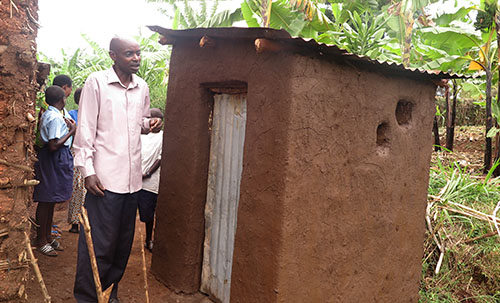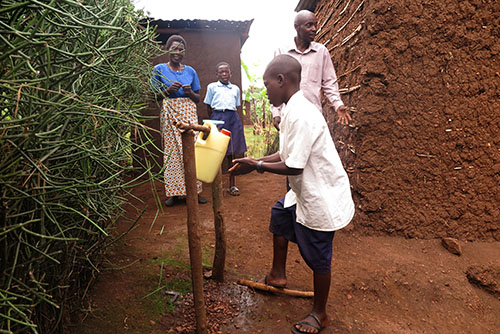

Rwanda’s Community Health Clubs Help Improve Hygiene and Sanitation
The Nturanyenabo family in Rwanda is enjoying a recent addition behind their house, and it’s more than a cosmetic upgrade. Their new latrine affects their health and that of their neighbors and guests.
Though Jean Damascene Nturanyenabo didn’t prioritize having a modern latrine, life without it was at times both challenging and embarrassing.

Jean Nturanyenabo built a new latrine for his family to keep their home hygienic. Photo by Emma-Claudine Ntirenganya/CRS
“It was personally very difficult for me to use a latrine during the day,” says Jean. “The most embarrassing situation was when I had guests. I used to feel ashamed to show them the kind of latrine we had!”
His wife, Therese, agrees, saying it was especially tough during bad weather. “You would think about waiting until the rain was over, but sometimes it was impossible.”
Their 13-year-old son, Laurent, says, “We used to find flies and spiders in the latrine because it was not properly built. We were afraid to go in there. Instead, we used to find hidden places, like in the banana fields and the forest.”
What made the family finally upgrade their latrine? They learned about the hazards of open sewage from their community health club, supported by Catholic Relief Services’ Gikuriro Program.
Community health clubs are changing minds
The Nturanyenabos are members of a local health club called Isoko y’Ubuzima, meaning “the source of healthy life.” They attend club meetings and activities weekly. The club teaches people about sanitation and hygiene to improve their environmental health and nutrition.
Some families do not lack a latrine or hygiene and sanitation practices because of poverty, but because they have no information about the associated benefits and risks. Sharing this knowledge is a key goal for members of the community health clubs.
Jean determined to upgrade his latrine after a random joint visit to his home by Gikuriro and Rwamagana District authorities, including Vice Mayor of Social Affairs Umutoni Jeanne.

Laurent Nturanyenabo washes his hands on the tippy-tap his father installed outside their new latrine. Photo by Emma-Claudine Ntirenganya/CRS
Jean promised to practice all the hygiene and sanitation skills he gained from the club at his home. Along with the new latrine, he also installed a tippy-tap so family members and guests can wash their hands.
He says, “I had the means to build a proper latrine. The only thing I was lacking was the knowledge about the importance of having it. I got that from my health club.”
Jean felt empowered to see his family grateful for the upgrade. “I could read it on their happy, excited faces,” he says. “I am so proud to have done something good for my family and my neighborhood, as we will no longer be a source for spreading diseases.”
The implementation of WASH practices beyond households
Community health clubs members are determined to ensure their village is clean. Recently, they decided to build a public latrine along the Kigali-Tanzania Road, a national road that passes through Gatika Village where truck drivers stop to sleep. Drivers use the nearby forest to defecate, and the club members realized this increases the risk of diseases in their neighborhood.
CRS has mobilized the construction of more than 8,000 new latrines in 8 districts since its program started. Some of them have been built by families without outside assistance. For the district’s poorest families, CRS and club members are providing iron sheeting and free labor.
Gikuriro is a 5-year project funded by the U.S. Agency for International Development, with additional support from the Netherlands Development Organization and the African Evangelistic Enterprise. It serves 8 districts, reaching approximately a quarter of the Rwandan population, and has helped establish 1,454 health clubs to date.

